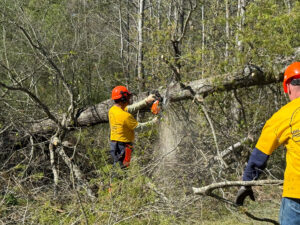Today’s post by Jeff Ingram is the fourth installment in our Coach’s Guide to Sunday School resource provided by the office of Sunday School and Discipleship. To see the full guide, visit ALSBOM.org/coachsguidetosundayschool.
How Could This Have Happened?
It started off as a good morning at Sunday School. Attendance was up, and the mood was festive with laughter and catching up with friends from the past week. Someone noticed that a husband and wife who were normally present were absent that morning. As the class moved into prayer requests and completing attendance records, the teacher asked if anyone had spoken with the absent couple this past week. No one had, so a class member mentioned he would contact them.
The following Sunday the class met for Bible study and again, without the aforementioned husband and wife in attendance. The teacher asked if the member had made contact with them this past week, and he sheepishly confessed that he had forgotten about it. A lady said she would be going to the wife’s place of business that week, and she would check on them then. The teacher also said he would make contact with the husband, but failed to write it down to remind him.
The third Sunday came and went. The class was busy planning an upcoming fellowship at someone’s home, as well as discussing a possible mission project. The now inactive husband and wife were overlooked amidst all the activity. The fourth Sunday was an emotional hour as some difficult prayer concerns surfaced from class members who were struggling with work and family illnesses. The fifth Sunday, the teacher was out, and one of the other class members taught his class.
The sixth Sunday began with the teacher reporting to the class that he had spoken with the husband of the formally active couple. Sadly, the man said he and his wife had separated six weeks earlier and had filed for divorce. Apparently there had been some issues in their lives that came to the surface, and they refused to reconcile their differences. This was a painful day for the adult Sunday School class. The class kept asking how this could have happened.
What if someone from the class had made contact with the husband and wife after they missed the first Sunday? Or the second Sunday … or the third? What if this husband and wife could have had a couple visit with them the first week who helped them work through their marriage problems? What if the pastor or a staff member could have provided them with counseling? Would they still be filing for divorce? No one knows for sure. But the teacher said he sure would like to have tried. But now it appeared to be too late to stop a marriage from ending.
It’s not that this Sunday School class didn’t care about inactive members. Nor was it true that the class wasn’t concerned about troubled marriages. The problem facing this class is the problem that faces most Sunday School classes: they are not sufficiently organized for ministry to those listed on their own class roll. A class should make adequate preparation so that no one slips through the cracks.
Relationships Are Key
Why do you think most people come to Sunday School? Is it for the Bible study? Maybe to share their prayer needs? Are they seeking the friendship and fellowship of others? Do they want to grow closer to the Lord? Do you think some people just come to Sunday School because it’s their Sunday morning habit to go to church? Of course, none of these reasons are wrong in and of themselves. However each of these reasons is tied to relationships, with others and with God. People’s needs are best met through relationships because there is a certain level of trust, empathy and accountability.
Jesus Is Our Model
“Then Jesus went about all the cities and villages, teaching in their synagogues, preaching the gospel of the kingdom, and healing every sickness and every disease among the people. But when He saw the multitudes, He was moved with compassion for them, because they were weary and scattered, like sheep having no shepherd. Then He said to His disciples, “The harvest truly is plentiful, but the laborers are few. Therefore pray the Lord of the harvest to send out laborers into His harvest” (Matthew 9:35-38, HCSB).
This scripture reminds us of some applicable Sunday School principles. Jesus went about teaching people the Word of God, reaching people with the Gospel through preaching, and ministering to people through healing. Jesus’ ministry of healing was aimed at “every sickness and every disease among the people.” This would include physical, mental, spiritual and emotional illnesses of all kind. Why did He do it? So He could share God’s love for the people.
What do you see when you look at other people? What about the people you see at work or school, your neighborhood, when out shopping and at sporting events? Luke 9 tells us that when Jesus “saw the multitudes, He was moved with compassion for them, because they were weary and scattered, like sheep having no shepherd” (v. 36).
Life is tough! It always has been and it always will be! Let’s face it – we need each other. People outside our class need us as well.
Sunday School is all about relationships. Most people do not drop out of Bible study classes because the teacher isn’t a good Bible teacher. Most people do not drop out of their Sunday School class because the class doesn’t pray enough. Most people do not drop out of their small group because the class doesn’t have enough fellowships or mission projects.
However, most people who do drop out of their Sunday School class may say something like this: “I had a death in my family and no one contacted me.” Or, “We had some sickness and missed several weeks; no one called us, so I guess it doesn’t really matter if we come or not.” Or even, “My wife and I separated and no one from our class called to check on why we quit coming. I guess we just didn’t matter.”
We can do better! So much better! A Sunday School class organized for ministry to its members will go a long way toward closing the proverbial back door and preventing people from slipping through the cracks.
Let’s At Least Start with Two Things
A class needs two things in developing an effective in-reach ministry: organization and training.
1. Organization
The teacher cannot do it all. He can try to do all the teaching, out-reaching, in-reaching, and the planning of fellowship and missions projects. He will eventually burn out and in the meantime, rob class members of the opportunity to discover and develop their God-given gifts in fulfilling the Great Commission.
A better, and more biblical way (see Ephesians 4:12), is to enlist class members to help the teacher minister to the class. Call them care group leaders or ministry leaders; the name is not as important as the function. Each care group/ministry leader is assigned three or four names of class members, maybe one active member, one semi-active member, and one inactive member. His or her job is to make contact with their care group members each week. This way the teacher is not trying to keep up with every class member every week. He has help, other leaders are discovering and using their spiritual gifts to minister to others, and there is a safety net preventing people from being overlooked and their needs not being met.
This plan will work with adult and student Sunday School classes. Leaders in the preschool and children’s Sunday School departments are encouraged to enlist others outside their group to assist them in ministry to children and parents.
2. Training
Enlisted ministry group leaders will need to know what’s expected of them and how to best minister to his or her care group members. The teacher can explain the importance of making a variety of weekly contacts, share the four-week plan, ask for testimonies from ministry leaders in Sunday School, and encourage them when group members have issues or seem apathetic. Teachers will find it helpful to see themselves as the care group leader for the care group leaders. The most important thing is that the ministry leaders contact everyone in their care group every week, being sensitive to needs God may reveal through the person.
Ministry List, Not Attendance Record!
It may seem like a small thing, but create a mindset that the preschool, children, student and adult Sunday School attendance rolls are not just for recording attendance or absences. Of course, we want people to be present, but we also want to minister to them whether they come or not. This highlights the importance of enrollment; that is, recording individuals’ names along with contact information so we’ll know who to contact and how to contact them.
Think about this. If our class rolls are only used for recording who is present or absent, then what do we do with people who never come? If the focus is only on attendance, then class leaders want to start dropping people who don’t come. But if the focus is on ministry, then it doesn’t matter if they come or not; the class will still minister to them and build relationships with them.
As mentioned earlier, people often drop out of Sunday School because they feel the class has let them down when they had a need. It will take time for relationships to heal and trust to be restored. Class leaders and members can begin the process of reclaiming inactive members, as well as strengthening relationships in the class.
Remember: when reaching out to members of your class or department, focus on ministry and the attendance may come! Always minister in Jesus’ name and leave the results to the Holy Spirit.
What About Chronic Absentees?
Every age group in Sunday School has had to deal with inactive members enrolled in their class or department. Sometimes it is difficult to get these chronic absentees to return to Bible study and fellowship with the class. Remember, however, you may be the only person in his or her life who is trying to point them to God. Don’t give up on them just because they’ve quit coming. Keep trying to build a relationship of trust and acceptance with them. You never know how the Holy Spirit will use your love and patience in a person’s life.
What about the person whom you’ve contacted several times and who keeps telling you, “I’ll be there Sunday.” It’s easy to get discouraged and think to yourself, “Yeah, right, I’ve heard that before!” Maybe what you need to do is to stop inviting them to Sunday School. That’s right, stop inviting them to Sunday School! Now, this does not mean the same thing as forgetting about them. Rather it means to continue building relationships with them through other ways than just trying to get them to come to class. For example, ask them if they have any prayer requests. Share those requests with the class on Sunday, pray faithfully for the requests, and call the person back in a week or so to get an update. Notice, you’re still making contact, but not trying to force them to come to Sunday School when they don’t seem interested in coming.
Below is a four-week contact plan that works well on the chronic absentee, as well as with prospects:
Week One Make a telephone call to contact for prayer requests.
Week Two Write a postcard, letter or email to let them know you are praying for them.
Week Three Pray specifically for the person throughout this week.
Week Four Make a quick front door visit dropping off a Sunday School book, magazine or devotional guide. Placing a mailing label on the front of the book with their name on it elevates the importance of the visit.
Of course, birthday and anniversary cards are always a good way to help build relationships with inactive members, prospects and active members.
Adult Sunday School Classes
Adult Sunday School classes contain all the leaders for the preschool, children and student Sunday School classes and departments. It is vital that adult class teachers see beyond their own class by recognizing the adults serving in other age groups. These age-group leaders should be included in the inreach ministry of the appropriate adult class.
For example, an adult class can adopt the teachers of a preschool department. Each week someone from the adult class should visit the preschool class and ask where help is needed and what are the prayer needs. These adults serving in preschool, children and youth classes should be invited to their appropriate adult class fellowships, parties and get-togethers. They should be included in receiving class announcements, prayer lists and resources. These few simple ideas, plus others, will provide a ministry of encouragement to those serving outside of their adult Sunday School classes and help them to be more effective at reaching, teaching and ministering to preschool, children, students and their parents.
Download Article (.pdf)







 by
by